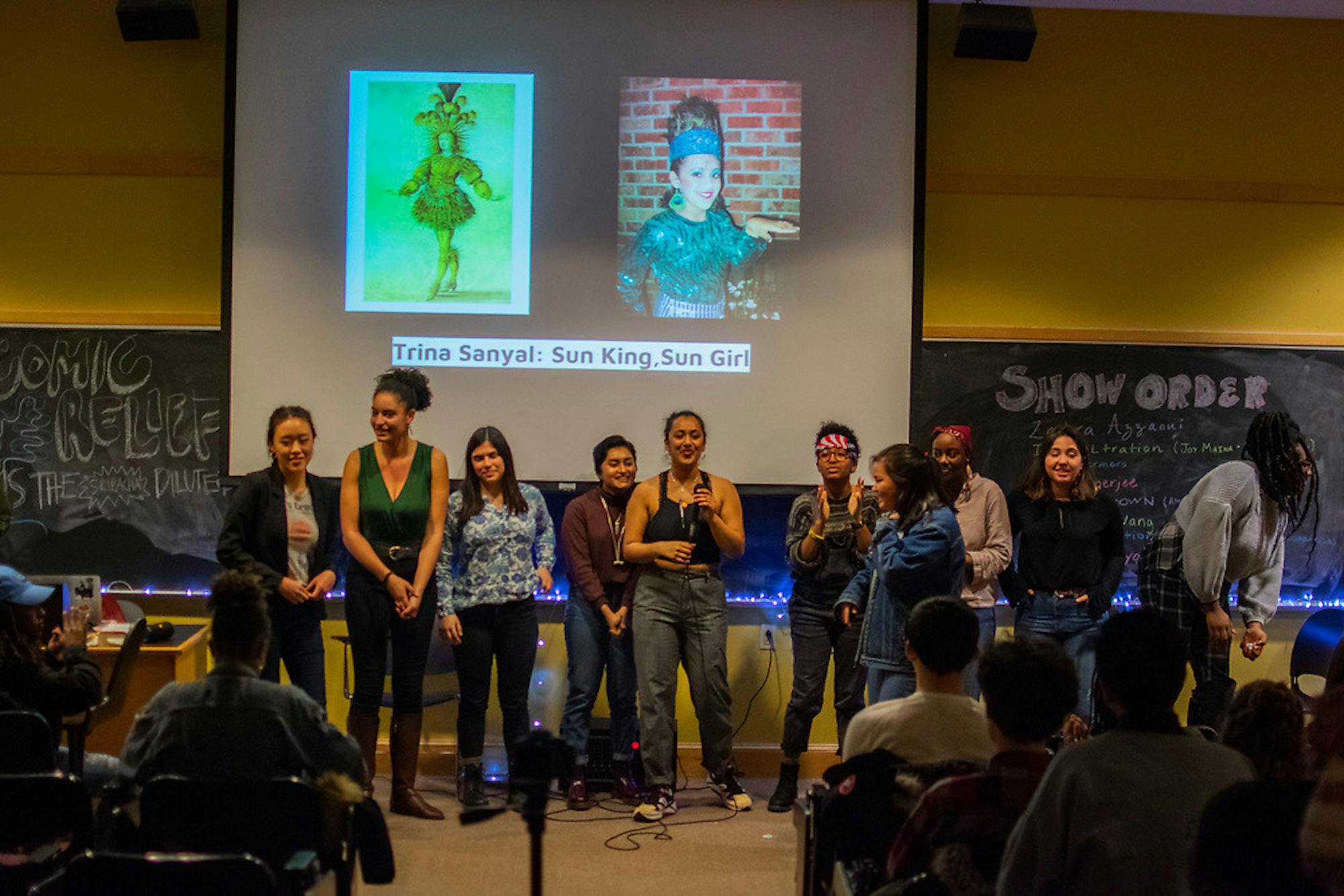"Comic Relief," Tufts’ first POC-centered comedy group, held their inaugural show, “Speculation: is the Sriracha Diluted Here?” on Friday evening. The hour-plus show featured acts ranging from a stand-up compare-and-contrast between French monarch Louis XIV and a mock talk show to a TED talk on how to use Tinder to scam free rides off men. The level of interest garnered by the event took even the members of Comic Relief by surprise, forcing a change of venue.
“We originally were planning to have it in the Women’s Center,” sophomore member Campbell Simmons said. “Then we saw almost 200 people interested in the event on Facebook, so we had to move to Braker [Hall]."
The steady evolution of Comic Relief from a handful of people having conversations about comedy in the Women’s Center into a performance group that can fill a lecture hall began last semester. It started with the group’s founder, sophomore Trina Sanyal, who came to Tufts as a first-year looking to get involved in the comedy scene on campus.
“When I applied to Tufts, I was really excited about joining the comedy groups here, so my first semester, I auditioned for a bunch of groups,” Sanyal said. “I was also in a [Tufts Funny Ladies] show, which was super lovely, with a really awesome group of people”
Sanyal also noticed in her experience with Tufts’ existing organizations that the comedy scene on campus lacked diversity.
“I was one of the few people of color in the group,” she explained. “It didn’t keep me from pitching things or being encouraged in that space, but I began to wish there was a space for people of color on campus.”
The initial idea behind Comic Relief grew out of this desire for Sanyal to have a venue in which she could more comfortably engage with comedy in an unfettered manner.
“My experience with comedy has always been extremely political,” she observed. “Before I came to Tufts, my friends and I always saw it as a political tool … a way of raising and upholding each other’s voices.”
Sanyal said that without any long-term plans in mind, she decided to hold a meeting at the Women’s Center. Fatima Blanca Munoz, the interim program administrator at the time, encouraged Sanyal to host the first meeting there. The first meeting in the Women’s Center was not designed to plan any kind of public performance; rather she initially intended it to serve as a forum for people of color to have conversations about comedy.
“I didn't anticipate it to become as big of a performance group as it now has become; I always thought it would be a space for people to come and talk about what they’ve experienced and what they think is funny,” Sanyal explained. “I was trying to build it into more of a community before it became a performance group, and now it’s luckily both.”
Though Comic Relief was not originally conceived as a performance troupe, the group’s members found that having a dedicated space enabled them to express their comedy more authentically.
“A lot of us share in our experiences, and because of that, we can also critique each other’s work in a way that’s productive, and not questioning whether the experience is true or not,” Sanyal said.
Her fellow members echoed that the group gives them a platform to inhabit their comedic personas more fully.
“Comic Relief gave me a space to express my experience … in a college environment that can sometimes be alienating,” sophomore Zara Wermers told the Daily in an electronic message. “[They] encourage me to be unapologetic in my identity.”
The cross-section of comedy that arises out of this close-knit environment addresses everything from obsessive speculation about the sex lives of Mr. and Mrs. Incredible to a sketch depicting bored FAFSA employees during the government shutdown. Other sketches mined humor out of the tedious U.S. visa process, which depicted Comic Relief members posing as ‘Murica-loving patriots seeking to infiltrate the country.
“I remember being outside the office with my parents, and we had to do three interviews … After the last one, we finally got a green card,” explained sophomore and co-writer Joy Maina.
Framing the sketch like a tepid job interview allowed Maina and her partner, sophomore Bizaye Banjaw, to lampoon the bureaucracy immigrants face in the U.S.
“It’s a job being an immigrant in this country,” a deadpan Maina said.
In another sketch, Simmons portrayed an author in a book interview that rapidly devolves into a mindless stream of contextless academic buzzwords and Sudoku.
“We wanted it to degrade and make less sense as it went along,” Simmons said. “It ended up coming out just the way we wanted it to.”
Following the success of its first show, Comic Relief does not currently have concrete plans for its next event, but the impressive turnout for “Speculation” certainly promises something in the future for the group. Possibilities mentioned included a potential performance at Jumbo Days. For now, however, its members are in no rush to dive headfirst into another frenzy of writing, rehearsing and planning. Or perhaps, like this interviewer, they are still distracted thinking about the logistics of Elastigirl’s expandable breastfeeding.
Tufts' first POC comedy group, 'Comic Relief,' makes its public debut

'Comic Relief' is pictured here at its first show on Mar. 8, 2019.





